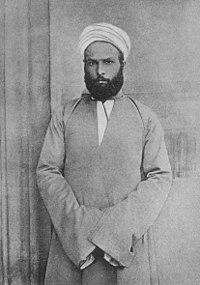Muhammad Abduh

Muhammad Abduh (or Muhammad 'Abduh) (Arabic: محمد عبده ) (Nile Delta, 1849 - Alexandria, July 11 1905, ) was an Egyptian jurist, religious scholar and liberal reformer, regarded as the founder of Islamic Modernism. A recent book titled "Islam and Liberty" regarded Muhammad Abduh as the founder of the so-called Neo-Mutazilism.[1]
Biography
Abduh studied logic, philosophy and mysticism at the Al-Azhar University in Cairo. He was a student of Jamal al-Din al-Afghani,[2] a philosopher and religious reformer who advocated Pan-Islamism to resist European colonialism. Under al-Afghani's influence, Abduh combined journalism, politics, and his own fascination in mystic spirituality.
He was exiled from Egypt in 1882 for six years, for his participation in the Urabi Revolt. Abduh spent several years in Lebanon, helping establish an Islamic educational system. In 1884 he moved to Paris, France where he joined al-Afghani in publishing The Firmest Bond (al-Urwah al-Wuthqa), an Islamic revolutionary journal that promoted anti-British views. When he returned to Egypt in 1888, Abduh started on his legal career and he was appointed a judge in the National Courts of First Instance in 1889 and in the Court of Appeals in 1891. During this time he continued to press for reform and published his main philosophical treatise the "On Monotheism" (Risālat at-Tawhīd) in 1897. In 1899, he was appointed an official mufti (Islamic legal counselor), a title he held until his death.
Abduh's treatise is an apologetic for main Islamic doctrines, and is addressed to Western-educated men, both Muslims and non-Muslims. He rejected the closing of the gates of ijtihad, and the practice of taqlid (the imitation of conclusions and analyses of earlier Islamic authorities without examination of their reasoning). Abduh taught that morality and law must be adapted to modern conditions in the interest of the common good. He argued that humans can in principle know good and evil by reason alone, but most failed to do so. The actual obligation to do what is right can only be known through God's revelation.
Abduh promoted the idea of salafiyya (pious forefathers). He asserted that the Islam of the forefathers was rational and practical. He also believed in ijtihad and that Islam is inherently adaptable, but was hampered by the rigid structures imposed by later generations. This made Abduh theologically closer to Twelver Shi'a Muslims then most other muslim scholars of the four Sunni madhhabs, mostly due to the influence of al-Afghani. Therefore, most modern Salafis disavow Abduh considering him to be a modernist and not Salafi at all.[3] Abduh's theories would be significantly modified by Hassan al Banna, the founder of the Muslim Brotherhood.
Abduh's most prominent disciples were Rashid Rida and Ali abd al-Raziq. Both students would write about the abolition of the caliphate in 1924 and further reforms they felt necessary to strengthen Islam.
Works
Other works by Muhammad `Abduh
(1903), Tafsir Surat al-`Asr, Cairo.
(1904) Tafsir juz’ `Amma, al-Matb. al-Amiriyya, Cairo.
(1927) Tafsir Manar, 12 volumes
(1954-1961), Tafsir al-Qur’an al-Hakim al-Mustahir bi Tafsir al-Manar, 12 vols. with indices, Cairo.
(1382), Fatihat al-Kitab, Tafsir al-Ustadh al-Imam…, Kitab al-Tahrir, Cairo.
(no date), Durus min al-Qur’an al-Karim, ed. by Tahir al-Tanakhi, Dar al-Hilal, Cairo.
(1966), The Theology of Unity, trans. by Ishaq Musa'ad and Kenneth Cragg. London.
See also
References
- Black, Antony (2001). The History of Islamic Political Thought. New York: Routledge. ISBN 0415932432.
- Watt, W. Montgomery (1985). Islamic Philosophy and Theology. Edinburgh: Edinburgh University Press. ISBN 0-7486-0749-8.
Notes
- ^ Ahmed H. Al-Rahim (January 2006). "Islam and Liberty", Journal of Democracy 17 (1), p. 166-169.
- ^ Kedourie, E. (1997). Afghani and 'Abduh: An Essay on Religious Unbelief and Political Activism in Modern Islam, London: Frank Cass. ISBN 071464355.
- ^ Salafi Publications | Historical Development of the Methodologies of al-Ikhwaan al-Muslimeen And Their Effect and Influence Upon Contemporary Salafee Dawah: Part 8 Updated
